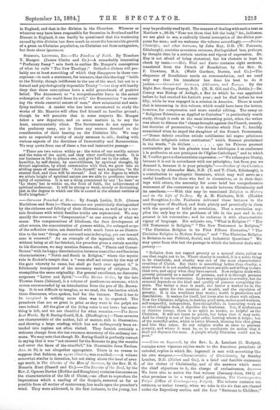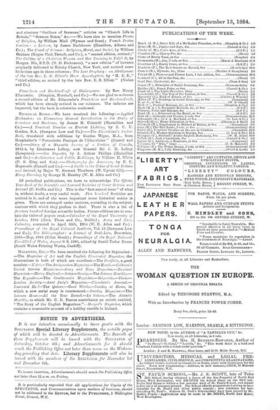SERMONS, LECTURES, ETC.—The Freedom of Faith. By Theodore T. Manger.
(James Clarke and Co.)—A remarkably intsresting "Prefatory Essay" sets forth in outline Mr. blunger's conceptions of what he calls "The New Theology." Orthodox divines will pro- bably see at least something of which they disapprove in these con- ceptions—in such a statement, for instance, that this theology "holds to the Trinity, though indifferent to the use of the word, but not to a formal and psychologically impossible Trinity "—but they will hardly deny that these conceptions have a solid groundwork of positive belief. The Atonement as "a comprehensible force in the actual redemption of the world from its evil," the Resurrection "as cover- ing the whole essential nature of man," show substantial and satis- fying realities. A reader who has been accustomed to study the works of Mr. Maurice will often find himself on familiar ground ; though he will perceive that in some respects Mr. Munger takes a new departure, and on some matters is, to say the least, unaccountably silent. The Sacraments do not appear in the prefatory essay, nor is there any sermon devoted to the consideration of their bearing on the Christian life. We may note as especially worthy of study sermons ix.-xiii., dealing with various aspects of the doctrines of Immortality and Resurrection. We may quote from one of these a fine and instructive passage :— " There are two voices within us : the voice of our earthly nature and the voice of the spirit, and they utter conflicting words. It is our business in life to silence one, and give full ear to the other. By humility, by self-denial, by unworldliness, by spiritual thought, by devout aspiration, by silent communion with God, we grow into an abiding sense of eternal life. 'Join thyself,' says Augustine, to the eternal God, and thou wilt be eternal.' Just in the degree in which we attain height of spiritual nature are we able to predicate immor- tality of ourselves. It is not a thing announced by any Lo here' or 'Lo there,' but is within us, the fruit of faith, the achievement of spiritual endeavour. It will be strong or weak, steady or fluctuating, just in the degree in which our life is looted in the eternal verities of God's kingdom."
—Sermons Preached at Ibrox. By Joseph Leekie, D.D. (James Maclehose and Sons.)—These sermons are particularly distinguished by the richness and felicity of their illustrations, as well as by a cer- tain freshness with which familiar truths are represented. We may specify the sermon on "Compensation" as one example of what we mean. The compensations of blindness, the finer development of other senses, the concentration of powers within, the enlarged scope of the reflective vision, are described with much force as an illustra- tion to the text " though our outward man is decaying, yet our inward man is renewed." As an example of the ingenuity with which, without being at all far-fetched, the preacher gives a certain novelty to his discourses, we may mention Sermon xiii., "Plants and Corner- Stones," with its happy discrimination between masculine and feminine characteristics ; "North and South in Religion," where the mystic rule in Ezekiel's temple that a "man shall not return by the way of the gate whereby he came, but shall go forth over against it," is felicitously interpreted of the necessary variety of religious life, exemplifies the same originality. For general excellence, no discourse surpasses "Letter and Spirit."—The Divine Order, by the late Thomas Jones (Isbister), is a volume of posthumous sermons, which comes recommended by an introduction from the pen of Mr. Brown- ing. It is not difficult to imagine, as we read, the fascination which these discourses, when spoken, had for the listener. That it has to be imagined is nothing more than was to be expected. The preachers that are as great in print as they were in the pulpit are rare indeed. All the glow of the living voice is not here; but some- thing is left, and we are thankful for what remains.—The Seven Last Words. By S. Baring. Gould, M.A. (Skeffington.)—These sermons are characteristic of the author, full of matter, rich in illustration, and showing a large reading, which has not nnfrequently been ex- tended into regions not often visited. They famish certainly a welcome change from the too common monotony of the ordinary ser- mons. We may note that though Mr. Baring-Gould is perfectly correct in saying that it was "not unusual for the Romans to gag the months and cover the faces of the crucified," his illustration from Tacitus, Ann. iv. 70, is not altogether appropriate. There is no reason to suppose that Sabinas, an eques illustris, was crucified.—A volume somewhat similar in intention, but not rising above the level of aver- age merit, is The Glories of the Man of Sorrows, by the Rev. H. G. Bonavia Hunt (Cassell and Co.)—The Sunrise of the Soul, by the Rev. J. Ogmore Davies (Hodder and Stoughton) contains discourses on the characteristics of the life of Christ,—an effort to reproduce the impressions which a reading of the Gospels, removed as far as possible from all matter of controversy, has made upon the preacher's mind. They were addressed, in the first instance, to the young, but
may be profitably read by all. The manner of dealing with such a text as Matthew x., 26-28, "Fear not them that kill the body," &c., indicates, we are glad to see, a radically liberal conception of the divine pur- poses for man; and we welcome the volume accord ingly.—Paules Christifer, and other Sermons, by John Kay, D.D. (W. Paterson, Edinburgh), contains seventeen sermons, distinguished less, perhaps, by thought than by a certain unction and vigour of expression. Dr. Kay is not afraid of being rhetorical, but his rhetoric is kept in check by taste.—Holy Week and Easter contains eight sermons, translated from the French of Bourdalone, by the Rev. G. F. Crowtree, M.A. (Wells Gardner, Derton, and Co.)—The eloquence of Bourdaloue needs no commendation, and we need only say that his translator has done his best to do it justice.—Occasional Sermons, Addresses, and Essays. By the Right Rev. George Conroy, D.D. (M. H. Gill and Co., Dublin.)—Dr. Conroy was Bishop of Ardagh, a See to which he was appointed before he had reached his fortieth year ; and he died before he was fifty, while he was engaged in a mission in America. There is much that is interesting in this volume, which would have been the better, however, for compression and more careful editing. The essay on "Religious Toleration as Applied to Catholics" is particularly worth study, though it ends at the most interesting point, when the writer was about to discuss the "charge brought against the Church, namely, her doctrine of persecution,"—the doctrine which Pius V. forcibly enunciated when he urged the slaughter of the French Protestants, —" Donee deletis omnibus exinde nobilissimo isti segue pristimus Catholicze religionis cultas restitaatar," which Bossnet proclaimed
in the words, " Je declare qua lea Princes peuvent contraindre par lee lois petioles tous lea heretiques se conformer a la profession et aux pratiques de l'Eglise Catholique," and to which M. Veuillot gave a characteristic expression :—" We refuse you liberty, because it is not in accordance with our principles ; but from you we demand it, because it is your principle."—Studies of the Christian Evidences, by Alexander Mair, D.D. (T. and T. Clark, Edinburgh), is a contribution to apologetic literature, which may well serve as a useful handbook for those who feel in themselves, or in their deal- ings with others, the necessity for some brief but comprehensive statement of the controversy as it stands between Christianity and its assailante.—With this may be mentioned Religion in. History and in the Life of To-Day. By A. M. Fairbairn, D.D. (Hodder and Stoughton.)—Dr. Fairbairn delivered these lectures to the working. men of Bradford, and deals plainly and practically in them with the question of belief in revelation. That a revelation sup- plies the only key to the problems of life in the past and in the present is his contention ; and he enforces it with characteristic vigour of language. His subjects are, "What is Religion 2" "The Old Testament in Religion," "The New Testament in Religion," "The Christian Religion in its First Fifteen Centuries," "The Christian Religion in Modern Europe," and "The Christian Religion in Relation to our Political, Social, and Industrial Questions." We may quote from this last the passage in which the lecturer deals with poverty :— "Religion does not regard poverty as a normal state, rather as one that ought not to be. Where charity is needed, it is a noble thing to be charitable, and charity was one of the most characteristic creations of Christ. But there is something better than charity, a state where it is not needed, where all men are able and willing to earn their own, and enjoy what they have earned. Now religion deals with poverty primarily as a matter of persons, and it is through persona alone that it can be overcome. Laws may mitigate its severity, but its removal depends on the kind and quality of persons composing the state. The better a man is made, the better a worker ho is, the fitter an agent for the creation of wealth, and the expulsion of poverty. It is the worthless that waste; worth is productive and distributive. It makes for itself, but loves also to share with others. Now the Christian religion, in making good men, makes good workers, self-respectful, independent, fore-thoughtful ; in honouring work as no other religion does, it dignifies the workman. Yet, if misfortune or disaster comes, there is no spirit so tender, so helpful as the Christian. It will not leave to perish, but helps that it may save. And its charity is not of the legal order, hurting where it helps ; but of the merciful order, which is twice blessed, blessing him thst gives and him that takes. So our religion works at once to prevent poverty, and where it must be, so to ameliorate its action that it shall not deprave the man. A people wholly Christian could not be poor."
—Notes on Ingersoll, by the Rev. L. A. Lambert (J. Hodges), contains some vigorous replies made to the American preachers of unbelief, replies in which Mr. Ingersoll is met with something like his own weapons.—Characteristics of Christianity, by Stanley Leathes, D.D. (Nisbet and Co.), is a brief and forcible statement of the claims of Christianity, and of the answers which meet the chief objections to it, the charge of exclusiveness, &c— We have also to notice the first volume (January-Jane, 1884) of what promises to be a very useful publication, The Contemporary Pulpit (Office of Contemporary Pulpit). The volume contains ten sermons, or rather twenty, when we take in the six that are classed under the Expository section and the four "Sermons to Children,"
and nineteen "Outlines of Sermons," articles on "Church Life in Britain," "Sermon Notes," &c.—We have also to mention Phases of Religion, by William Mall (Wyman and Sons) ; French Protes- tantism : a Lecture, by James Backhouse (Hamilton, Adams, and Co.) ; The Creed of Science : Religious, Moral, and Social, by William Graham (Kegan Paul, Trench, and Co.), a "second edition, revised ;" The Calling of a Christian Woman and Her Training to Fulfil It, by Morgan Dix, S.T.D. (N. D. Dickenson), "a new edition" of lectures originally delivered in Trinity Church, New York, and noticed some little time ago in these columns ; The Last Prophecy : an Adridgment of the late Rev. E. B. Elliott's Hone Apoccdypticce, by "H. E. E.," "third edition, as revised by the late Rev. E. B. Elliott" (Nisbet and Co.)



































 Previous page
Previous page